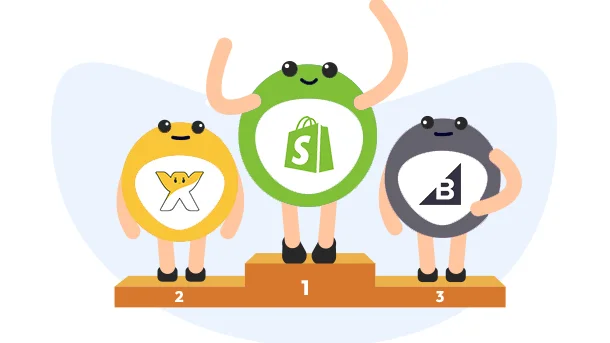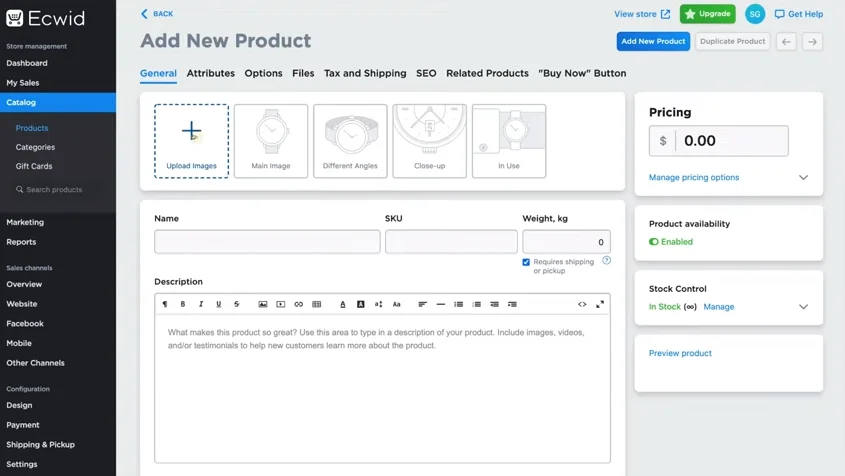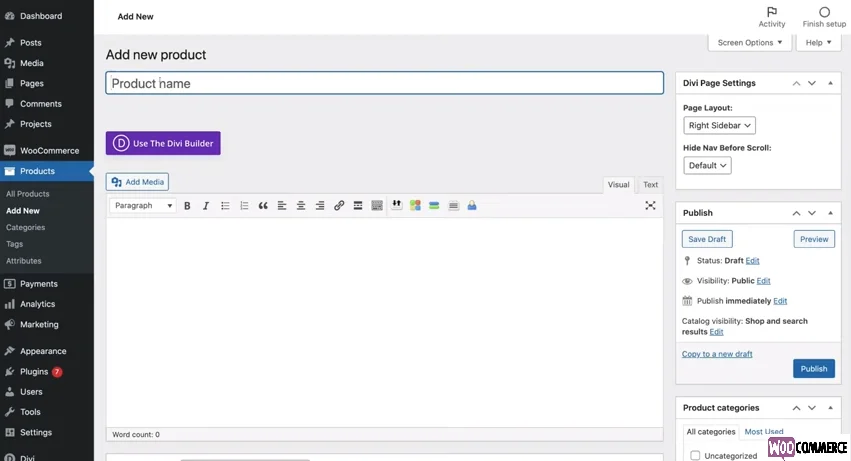
Nowadays, over 80% of consumers shop online, with the industry expected to become worth a trillion dollars by the end of the year. If you run an online business, investing in the best eCommerce shopping cart software is essential.
However, picking the best eCommerce shopping cart software is not as easy as you might think. You’ll have to make several critical decisions on how much you are willing to invest, what additional features you might need, and whether you prefer something ready-made over custom software.
If you’re on the lookout for the best eCommerce shopping cart software, this guide will help you choose the right one for your business.
Shopping cart software solutions allow website visitors to purchase goods and services online through convenient payment portals. They also enable business owners to track and manage inventory, monitor sales, offer discounts, and maintain loyalty programs.
What makes an eCommerce software “great” will depend on the following factors.
User experience: Online shopping cart software should be easy to use for both seller and consumer. The best ones are easy to set up, even with little to no programming experience.
Value for money: eCommerce software costs anything from a few hundred to thousands of dollars. If you’re unsure which platform you prefer, take advantage of trial periods to determine how well your software performs and integrates with existing systems.
Scalability: Even if a basic eCommerce solution is just what your business needs at the moment, there’s no guarantee it’ll continue to work for you as your business grows. Consider a platform that can scale up along with your operations.
Mobile-friendliness: Of the millions of online shoppers that own a smartphone, roughly 60% of them use it to shop. To reach a wider audience, you’ll need to invest in mobile-responsive software.
User reviews: You can learn a lot about a platform by consulting shopping cart software reviews.
Product handling: Some eCommerce solutions are specifically tailored to sell physical or digital products. For instance, if you are selling physical products, you may want to select a platform that you can use to track courier services.
Security: While cash on delivery is a necessary and common payment option, most shoppers prefer to use credit cards. Choose a web provider with a Secure Sockets Layer (SSL) certificate to protect sensitive customer information. Software with additional website monitoring tools can identify any security or performance issues.
Different eCommerce platforms will have a wide range of solutions and may not always be the same. However, you can expect to see these standard functionalities across nearly all of them.
Payment gateways: Most, if not all, shopping cart platforms should have a payment processor that supports common payment options such as Visa, Mastercard, and PayPal. The more payment methods your software can accommodate, the better.
Automatic calculation: Online checkouts involve a lot of miscellaneous fees. Your software should be able to calculate taxes, special discounts, and shipping rates so that pricing is completely transparent.
Currency compatibility: If you ship products internationally or run international stores, pick a platform that accurately applies conversion rates.
Language options: If you sell to international customers, having multiple language options will encourage shoppers to browse and check out.
Analytics and insights: Tracking sales trends is the key to increasing overall profits. Use software that can keep track of orders, average sales, and abandoned carts.
SaaS (software-as-a-service) and open-source are the two primary types of eCommerce software. They are differentiated by how they’re distributed and who manages them.
Open-source software is available to any developer who wants to access and edit the source code. The software is often free, with add-ons and bug fixes constantly and readily available. Unlike SaaS, an open-source shopping cart does not have centralized customer support. Users will also have to perform updates themselves.
SaaS solutions combine shopping cart features with web hosting. With SaaS software, you can run your online store directly from a web browser. In addition, developers are responsible for handling updates and maintenance, so you won’t have to install anything yourself. With that in mind, SaaS digital shopping cart solutions can be expensive.
While integrations are not necessary, they are helpful and often preferred. Integrating your online shopping cart system with other platforms can save you time and money if you already have existing CRM, accounting, and project management software.
How much you pay for an online shopping cart service will depend on what it can offer. Most online shopping cart software have packages for small, medium, and large companies. These are often available on a subscription basis, with monthly fees costing anywhere between $20 and $150.
You’ll also likely have to pay additional transaction fees, usually charged by the payment gateway and/or for using the service itself. If you don’t use a specific software’s built-in payment gateway, transaction fees can cost as much as 2% of a single purchase.
In addition, you’ll also have to consider whether the software charges for monthly data and storage. Naturally, cheaper plans will offer smaller storage capacity. You can determine how much monthly data you consume on average by tracking statistics like the size of the images you use on your website and how many site visitors you get in a month.
8 Million+ Ready Automations
For 750+ Apps
Here are our top picks for the best eCommerce shopping cart software on the internet:
Shopify is a go-to choice for many businesses with online stores. It boasts powerful features such as logo makers, custom website designs, domains, and even the option to buy an existing shop. You can even use Shopify to chat with customers, track orders, and send invoices. You can automate hundreds of Shopify tasks with Integrately.
Thousands of themes: Compared to other eCommerce platforms, Shopify has more than 1,300 premium and customizable themes.
Powerful integrations: Shopify integrates with nearly every third-party app you need to run an online store. You can easily find an extension or plugin within the app store if it’s not built-in.
Shopping cart abandonment notifications: A customer might abandon their cart now and then. With Shopify, you can recover and remarket them for a successful future sale.
No-refund policy: Unfortunately, you won’t be able to recover any lost funds if a sale goes wrong.
No multiple discounts: Sellers can only provide one discount per order.
Associated app fees: To incorporate multiple apps into your Shopify store, you’ll have to pay a monthly app subscription fee.
A Basic plan costs $29/month, while Shopify and Advanced plans cost $79/month and $299/month, respectively.
Click here to try Shopify today!

For large-volume sellers, BigCommerce is an excellent option. It boasts multiple payment options such as through money order, checks, or bank transfer and doesn’t charge any fees from third-party gateways. If you’re having trouble managing BigCommerce’s plenty of features, automate them with Integrately.
Channel manager: Connect products already listed for sale on other platforms like Amazon or eBay.
Unlimited use: Every plan provides unlimited products, storage, and bandwidth.
Multiple online payment processors: BigCommerce offers many payment processing options like Stripe, Braintree, PayPal, and Amazon and does not charge any third-party fees.
No POS system: Unlike Shopify, you can’t take in-person payments as BigCommerce lacks a POS system.
Not ideal for small or medium businesses: Businesses earning below $50,000 have to set up sales tax rates and automated shipping.
Annual sales thresholds: Users cannot exceed a certain amount of sales per tier. For instance, Standard tier users cannot exceed $50,000/year.
Standard plans cost $29.95/month, while Plus and Pro plans cost $79.95/month and $249.95/month, respectively. You can also try BigCommerce free for 15 days.
Click here to try BigCommerce today!

If you occasionally make in-person sales, Square is the shopping cart platform for you. It organizes online and offline sales in a single intuitive dashboard that produces easy-to-read visual reports. It is also compatible with dozens of POS systems and has excellent uptime. Automate hundreds of actions on Square with Integrately.
You can start building an online store on Square for free or get a Professional account that costs $12/month. Performance and Premium plans cost $26/month and $72/month, respectively.
Click here to try Square today!

Are you looking to build a business website and online store all in one? Try Wix – this drag-and-drop builder has hundreds of free templates and can get your website up and running in just a few minutes.
Powerful ADI tool: Answer just a few questions about what you plan to sell and what kind of elements you’d like to see on your site and Wix’s Artificial Design Intelligence feature will whip something up for you.
Step-by-step guide: If you’re setting up a professional email address, social media ads, or payment gateway for the first time, Wix walks you through pretty much everything.
One-click install: Integrate anything from accounting software to shipping couriers in just one click.
No template switching: Unlike other digital shopping cart and website building software, Wix doesn’t let you change your template once you’ve chosen one.
No payments on a free domain: If you choose to use Wix for free, you won’t be able to receive any payments.
You can try Wix for free for 14 days then get a Basic Business Plan for $30/month. Payment processing fees cost 2.9% plus 30 cents per credit card transaction.

Ecwid is an excellent shopping cart platform for businesses with more than one social media platform but no optimized website. With it, you can sell items from sites like Google, Instagram, or Facebook. It has a generous free plan and affordable tiers if you need advanced features. You can even automate tasks like receiving credit card payments and completing transactions with Integrately.
Extensive free tier: If you’re new to eCommerce selling, you can try out Ecwid’s free tier, which allows users to sell up to ten products at a time. You can also enjoy powerful features like automatic tax rate calculations, discounts, and inventory tracking.
Responsive design: Ecwid’s mobile integration is seamless – you can even edit product pages from your phone.
Superior language options: For international sellers, Ecwid offers functionality in over 50 different languages.
No add-ons: With Ecwid, what you see is what you get. By purchasing a paid tier, you simply increase the number of products you can sell.
Manual coding: While Ecwid is simple to use, you’ll have to set up and code everything manually.
Slow growth: Because it doesn’t offer extra features like website building, Ecwid may not be ideal for scaling businesses.
You can use Ecwid for free or get a Venture plan for $15/month. Transaction fees depend on the payment gateway.
Click here to try Ecwid today!

For businesses with an already-existing WordPress website, WooCommerce is the best shopping cart solution. Not to mention, the plugin is entirely free. If you already have Integrately, you can easily automate all your WooCommerce tasks.
Sizable extensions library: If you’re looking for more than what the basic plugin can do, WooCommerce has an extensions marketplace for add-ons like real-time shipping rates, various payment gateways, and even newsletter subscriptions.
Compatible with existing backend: View your orders, create coupons, and dissect sales reports all from your WordPress dashboard.
Completely free: If you’re on a budget, WooCommerce won’t break the bank, but you may have to pay extra for other handy features.
Expensive plugins: While you can access plenty of features for free, some of WooCommerce’s extensions cost upwards of $29.
Additional costs for payment and shipping: Some payment and shipping options can add up, so choose your solutions wisely.
Requires some coding: If you want WooCommerce to provide full functionality, you may have to tweak some code.
WooCommerce is a free extension and comes automatically installed with a $45/month eCommerce plan.
Click here to try WooCommerce today!

When it comes to picking the best eCommerce shopping cart software for your business, remember that these solutions are not designed for every case. What may work for a small retailer may not work for an upscale technology company. Ultimately, you’ll have to consider certain factors like:
How quickly you need to get your website up and running
Whether you want to sell products and services in-person, online, or both
Whether you already have an existing website and need a plugin
If you need to build an operational website from the ground up
Whether you are just starting out or are a large-volume seller
Whether you are looking for a plethora of features or can function using simple ones
Online reviews – do positive reviews outweigh negative reviews?
No two businesses have identical needs, even within the same industry. For instance, sellers who run both online and brick-and-mortar shops might benefit more from Square, which has an in-person POS. On the other hand, startups might find Wix’s easy-to-use tools more helpful than those of BigCommerce, which are better suited for enterprises.
If you run an online store, the best eCommerce shopping cart software can track inventory, facilitate safe and smooth transactions, and let you know how your business is doing. With the options listed above, you can start accepting payments online in just a few clicks.
Make the process even more seamless by automating menial and repetitive tasks with Integrately! With over 8 million automations for 600 apps, you can save hundreds of dollars on administrative tasks every year.
When choosing the best shopping cart software, see that it should do more than just enable you to post and sell your products online. When picking the right platform, you’ll want to consider factors like: Value for money
Key features and add-ons
Scalability
Full-service capabilities
Third-party integrations
Wix is the easiest shopping cart to use, if you’re looking to build a complete website from scratch. Thanks to its Artificial Design Intelligence capabilities and easy-to-navigate interface, you won’t need any development skills or technical expertise to create a beautiful and fully-functioning website with Wix.
In addition, Wix’s site-building wizard walks you through every step of the process – from introducing premium themes to SEO tools and social media integration.
Yes, PayPal does offer a shopping cart in association with dozens of partner carts including:
Big Cartel
Magento
Shopify
3cart
Volusion